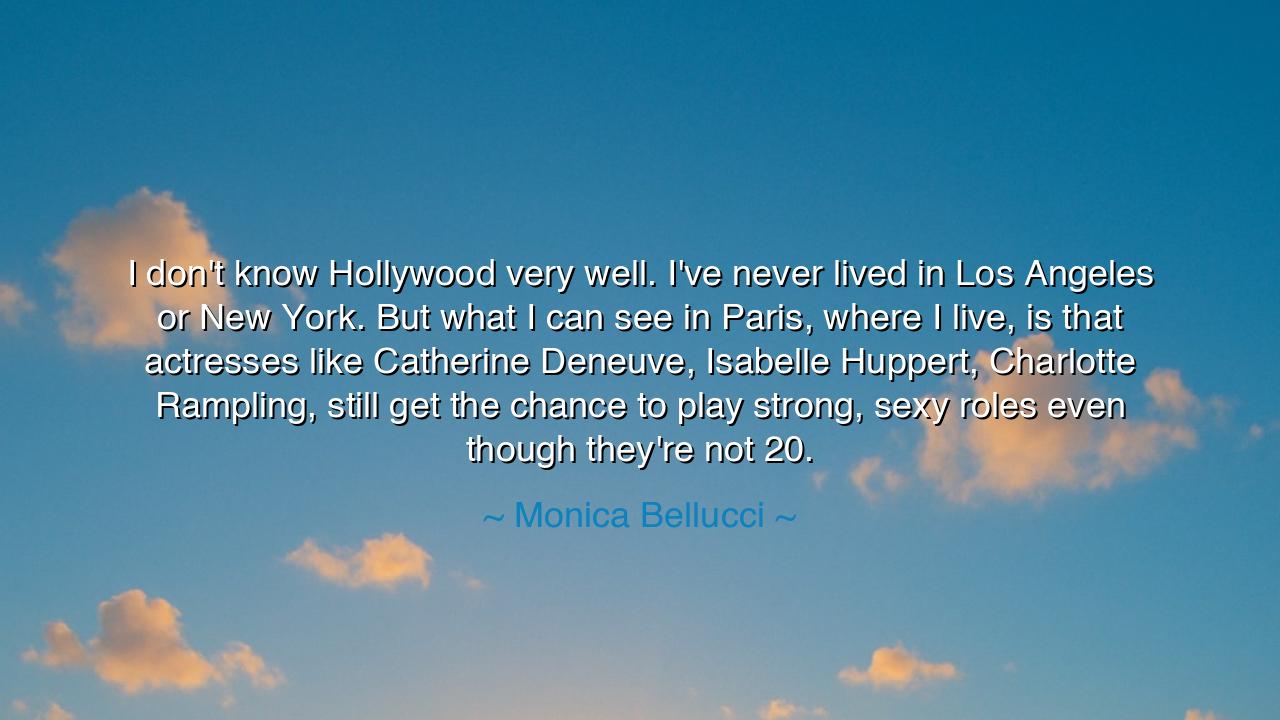
I don't know Hollywood very well. I've never lived in Los Angeles
I don't know Hollywood very well. I've never lived in Los Angeles or New York. But what I can see in Paris, where I live, is that actresses like Catherine Deneuve, Isabelle Huppert, Charlotte Rampling, still get the chance to play strong, sexy roles even though they're not 20.






"I don't know Hollywood very well. I've never lived in Los Angeles or New York. But what I can see in Paris, where I live, is that actresses like Catherine Deneuve, Isabelle Huppert, Charlotte Rampling, still get the chance to play strong, sexy roles even though they're not 20." These words, spoken by the distinguished Monica Bellucci, offer a reflection on the difference in how women are valued in cinema across different cultures, particularly when it comes to age and the roles women are afforded. Bellucci’s statement stands as a testament to the enduring strength of women’s characters, even as time passes, and the shift that occurs when society values the maturity, wisdom, and power of women—qualities often left overlooked in places where youth is seen as the ultimate virtue.
In her words, Bellucci captures a truth about the power of aging—a truth that is often suppressed in the world of Hollywood, where the pursuit of youthfulness can overshadow the wisdom and depth of a woman’s later years. In Paris, however, there is a different narrative. Here, actresses such as Catherine Deneuve, Isabelle Huppert, and Charlotte Rampling continue to shine in roles that allow them to express their strength, sexiness, and complexity beyond the constraints of youth. In the ancient world, this idea of honoring maturity was celebrated. The Greeks, for example, revered figures like Sophocles and Aristotle, who grew wiser with age. To them, the pursuit of knowledge and experience was what granted a person true majesty.
Consider, for instance, the example of Queen Elizabeth I, the powerful monarch who ruled over England for nearly five decades. Despite the passage of time and the inevitable march of age, Elizabeth remained an imposing figure. Her strength was not defined by her appearance but by her intellect, resolve, and influence. Much like the actresses Bellucci mentions, Elizabeth was celebrated not for her youthful beauty, but for the depth and strength she embodied. The aging body, in both Elizabeth’s time and in modern cinema, was a vessel that carried immense power and wisdom—qualities that should never be disregarded.
In the world of cinema, as in life, there is often a tendency to devalue women once they pass a certain age, limiting them to roles defined by their appearance. But what Bellucci highlights is the possibility for women to continue to be celebrated for their depth, their maturity, and their experience. The actresses she names are proof that true beauty does not lie in youth alone, but in the life lived, in the journeys undertaken, and in the stories a woman has to tell. Their continued success on the screen offers an alternative vision, one where strength and sensuality are not confined to a young body, but extend across the span of a woman’s life.
The ancient teachings of Homer and Ovid resonate here, reminding us that the most heroic figures often appear after they have weathered the trials of life. Consider Penelope, who, though she waited years for the return of her husband Odysseus, was no less heroic for the passing of time. It was her intellect, patience, and wisdom that made her an archetype of feminine power. The lesson here is that true strength is not tied to the body’s ability to remain young but to its ability to endure, to continue, and to transform as time progresses.
From Bellucci’s words, we learn that women should embrace their aging selves—not as something to be feared or hidden, but as a testament to all that they have accomplished. They, like the actresses she admires, can continue to play powerful roles in the narrative of life, challenging the norms that seek to limit them. Aging is not an obstacle, but an invitation to new chapters, new stories, and deeper connections to both oneself and the world around them. There is beauty in maturity, for it reflects the journey that all great figures, both men and women, have undertaken throughout history.
So, what is the lesson here? It is this: honor your own aging. Just as Catherine Deneuve, Isabelle Huppert, and Charlotte Rampling continue to shine in their roles, so too can we continue to thrive as we age. Let us not be swayed by a world that idolizes youth, but instead, let us draw strength from our experience, wisdom, and the richness of the stories we carry within us. The future belongs not to those who remain unchanged, but to those who grow and evolve, who embrace their journey, and who continue to live fully with each passing year.






AAdministratorAdministrator
Welcome, honored guests. Please leave a comment, we will respond soon